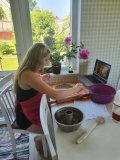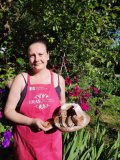International Event in Slovenia - June 2021
Društvo za podporo civilne družbe, hosted the first ERAS project international partner event. The event was held in an online environment between 17 and 23 June 2021.
Društvo za podporo civilne družbe, the leading partner of the ERAS project which connects 13 European cities intending to exchange good practices for volunteering in partner countries and across Europe, hosted the first international partner event. The event was held between 17 and 23 June 2021, this time in an online environment. The first international event was aimed at learning about good practices in the field of volunteering and population ageing in the municipality of Litija and the regulations of volunteering in partner countries.

The meeting was opened with a presentation of good practices in the field of volunteering in the municipality of Litija. The event was opened with a welcome speech by Lijana Lovše, deputy mayor of Municipality of Litija who made a brief presentation of the municipality and its efforts to respond to the needs of an ageing society. She explained that the Municipality of Litija is also committed to development of volunteering, which is also evident from the many projects which include volunteers. The common thread of all the presentations was the theme - the ageing population and raising the quality of life of the elderly. Volunteering is quite widespread in the municipality of Litija. The municipality is striving to obtain the title of a volunteer-friendly municipality. The title is awarded to Slovenian municipalities by the largest voluntary organisation in the country for the active promotion of citizens' volunteering and support for the activities of volunteers and voluntary organisations. Local authorities are aware of the importance of volunteering and believe that volunteers are a strong binder of the local community. Therefore, they support volunteer projects and also take an active approach to projects that promote volunteering.
At the meeting, partners and other attendees had the opportunity to gain an in-depth knowledge of the chosen good practices on volunteering and population ageing in the Municipality of Litija, all of which are in some way supported by the Municipality. The partners learned how greater mobility of the elderly is achieved with the Sopotniki (Co-travellers) program. Anu Kahuna from Zavod Sopotniki pointed out how important mobility is for the quality of life of the elderly, especially those from rural areas. They are often excluded from cultural events and social life due to their distance from the city centres and less developed public transport networks. The Sopotniki program, with the help of volunteer drivers, enables the elderly to visit cultural events, exhibitions, go to the doctor, to the store, do daily chores or visit friends. Through repeated use of the service and their chats, volunteers and the elderly have made good friendships.
Seniors for seniors is another activity intended for the better quality of life of the elderly in the municipality. It is implemented by the Litija Pensioners' Association. Tanita Planinšek presented the program that involves socializing and mutual assistance among senior citizens. Volunteers of the Pensioners’ Association brighten up the days of those over the age of 65. They make regular visits or phone calls, help with small tasks and chores or help with instructions on where and how to arrange certain matters.
Regular exercise is important for keeping vitality in old age. The School of Health Association is aware of this and implements a 1000 movements program, a daily group exercise for the elderly. The exercise is performed under the supervision of trained volunteers and experts (trainers, kinesiologists etc.). Through daily exercises, the elderly maintain good health for long independent life. The participants had the opportunity to test the exercises. We took an active break during the presentations. Under the guidance of Eva Jeza, a volunteer at the School of Health who introduced us to the program, we stretched and at least had a small impact on reducing the effects of prolonged sitting.
The day ended with the presentation of the European project EU_SHAFE, which aims to improve policy and practice in European regions by developing a comprehensive approach to smart, healthy and age-friendly environments. Anita Molka from the Development Centre of the Heart of Slovenia presented the establishment of a model and services for helping the elderly at home as the most important result of the implemented project activities, the so-called Point for the elderly, a new project created in response to the needs of the local environment.

During the week, we also discussed the regulation of the field of volunteering in partner countries. As part of the Regional NGO Center for the Zasavska region, Klara Kržišnik presented them with good practices and efforts for the development of NGOs and volunteering. In cooperation with Slovenian Philanthropy, Primož Jamšek and Klara Kržišnik presented the regulation of the field and incentives for the development of volunteering in Slovenia. The discussion allowed participants to learn about effective regulations around Europe and how to implement them in their own country.
By sharing the review of the regulation of the field of volunteering in the partner countries, a comprehensive review of good practices was created at both the national and local levels, which can be transferred to other countries and communities. It was interesting to hear how differently the field of volunteering is regulated in the partner countries. In some partner countries, the field of volunteering is regulated by the law on volunteering. On the other hand, some have been fighting for almost a decade to adopt a strategy that would at least slightly regulate this area. In Latvia, volunteering is promoted through measures such as additional points when enrolling in college, and Croatia with additional points for voluntary organizations when applying for certain tenders. Support for funding volunteer projects is also very different. In Hungary, for example, they do not have a funding scheme at the national or regional level, but voluntary organizations get tax exemptions in some cases. Since most of the project partners are NGOs, it was interesting to hear the other side of the story. The Portuguese partner, the Municipality of Lousada, presented how local authorities think about volunteering and how they support volunteering activities and projects. The discussion served as a source of inspiration for all participants to further develop regulations, incentives and a support system for volunteering.

During the project, partners from Slovenia, Serbia, Bosnia and Herzegovina, Portugal, Malta, Albania, Lithuania, Latvia, Croatia, Macedonia, Hungary, Greece and Bulgaria will also encourage volunteering by making videos of volunteer stories. To make the campaign as successful as possible, we have prepared a two-day workshop for partners aimed at strengthening the video skills of organizations to master digital storytelling in the field of inclusion, engagement and promotion of active citizenship and volunteers. The workshop was led by Aliaksandra Ihnatovich, a communication expert and visual culture researcher with almost ten years of experience mentoring various film, video and media workshops for young people and adults, focusing on groups with fewer opportunities, NGO representatives and activists.
The workshop covered all the basic skills and procedures needed to record a short video using a mobile phone, from conceptualization and camera skills to editing and presenting to the audience. 13 video stories of European volunteers were created, with which we encouraged and promoted volunteering in European cities.
The Europe for Citizens program encourages an understanding of the history, values and diversity of the EU. Therefore, we ended the first part of the international event with a fun afternoon. We presented the city of Litija, Slovenia and its culture to our partners through Slovenian cuisine. During the event, which took place online due to the measures to contain the Covid-19 epidemic, we still managed to bring our municipality closer to our partners and part of our culinary culture by baking potica simultaneously in all partner cities. Our partners could not hide their enthusiasm.
Follow the Facebook page of the ERAS project, where we will share with you volunteer stories and good practices from other European countries.
The ERAS project is co-financed by the Europe for Citizens program of the European Union.























.png)




